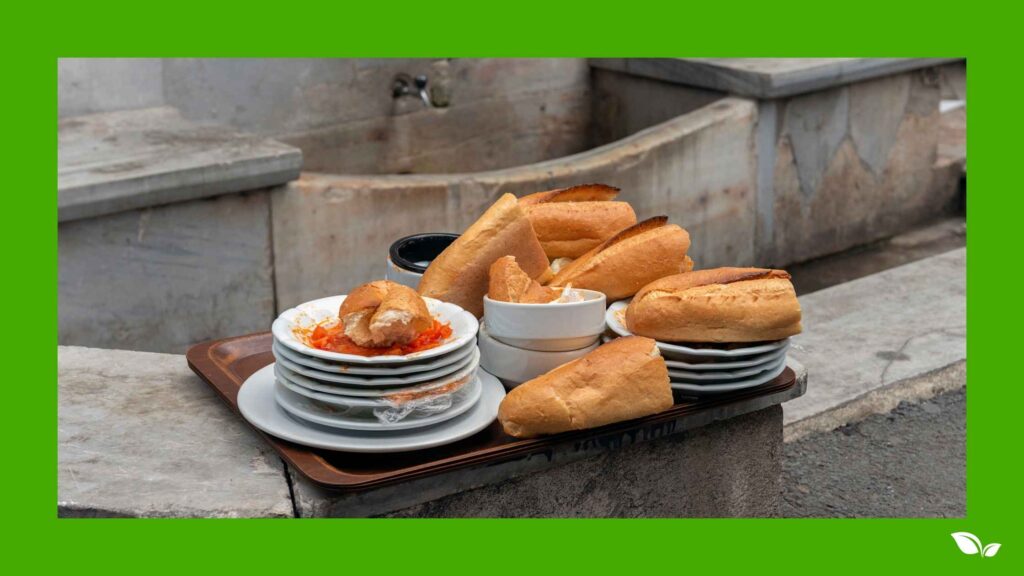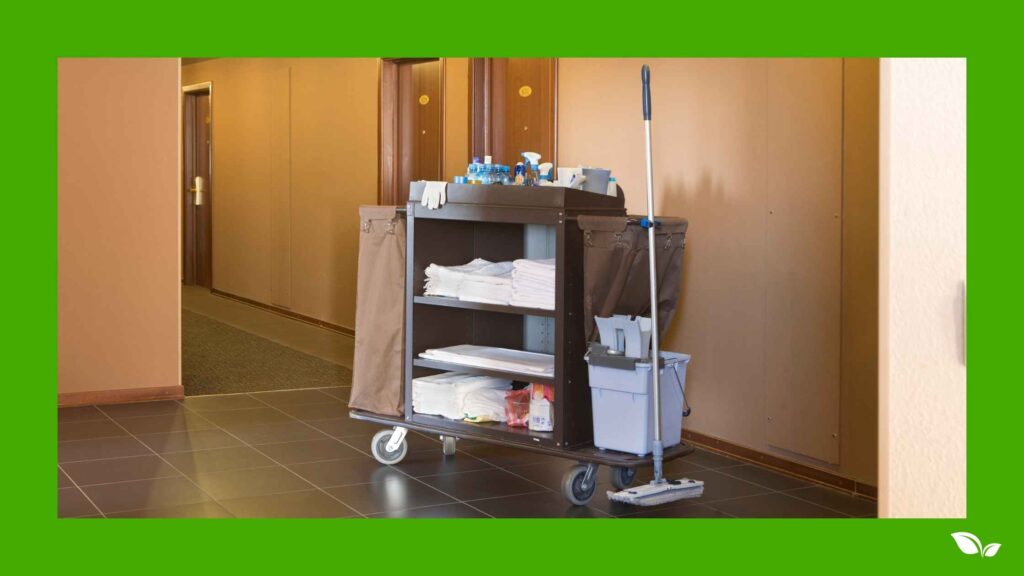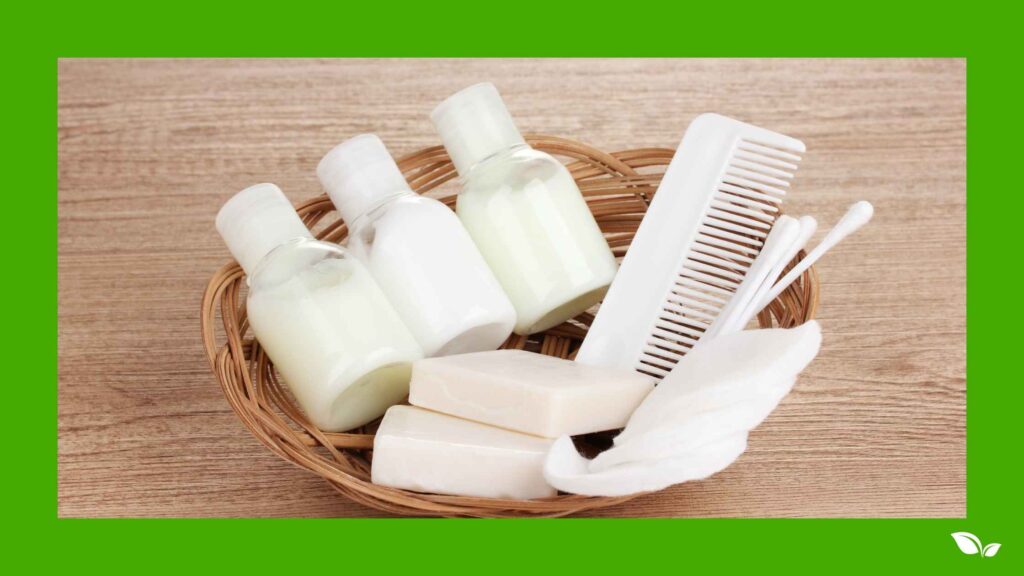1. What Kinds of Waste Do Hotels Produce?
The kinds of waste hotels usually produce are general waste, recyclable waste (also known as dry mixed recycling), food waste, and glass waste.
Hotels generate particularly large volumes of waste in comparison to other businesses.
This is due to the various facilities they may have on-site and their need to consistently refresh amenities for new guests.
Whether you run a quaint countryside B&B, a buzzing hostel in the city centre, or a boutique hotel, implementing the right waste management system is crucial for success.
It saves your hotel business time, money and resources whilst also having a positive impact on the environment.
Hotel waste management can be straightforward provided you choose a waste partner that genuinely cares about you and your hotel.

Types of Waste Hotels Produce:
General waste
- Single-Use Toiletries: Disposable shampoo bottles, soap wrappers, and other single-use bathroom amenities.
- Bedding and Linens: Worn-out or damaged bed sheets, towels, and linens that can’t be reused.
- Food Packaging: Non-recyclable packaging materials like plastic wrap, Styrofoam containers, and foil.
- Broken or Damaged Furniture: Furniture items, such as chairs, tables, or fixtures, that are no longer usable. and cannot be recycled.
- Cleaning Supplies: Non-recyclable empty containers of cleaning chemicals and materials.
Check out our dedicated General Waste page for more information on how to dispose of your general waste.
Recyclable (Dry Mixed Recycling)
- Paper Products: Newspapers, magazines, brochures, and cardboard packaging.
- Plastic Bottles and Containers: Empty plastic bottles, containers, and packaging used for beverages, toiletries, and cleaning supplies.
- Glass Bottles: Empty glass bottles from beverages like wine, beer, and soft drinks.
- Metal Cans: Empty tin or steel cans used for beverages or food items.
- Cardboard Boxes: Packaging materials and boxes used for deliveries and shipments.
- Printer and Office Paper: Used paper from in-house management office or reception, including printouts and documents.
- Ink Cartridges: Recycling used ink and toner cartridges from printers.
Properly segregating and recycling these materials helps reduce the environmental impact of a hotel’s waste and contributes to sustainability efforts.
Hotels often have recycling programs in place to manage these recyclable items responsibly.
Food
- By-Products (preparation waste from trimmings, peels, and other food preparation waste generated during the cooking process.)
- Expired or Spoiled Food: (perishable items that have passed their expiration dates or have become spoiled and cannot be used)
- Leftovers: (leftover food on guests’ plates that cannot be reused).
- Overproduction/ Uneaten Inventory: (food that remains unserved or untouched on buffet tables or under heat warmers).
- Spilled/ Ruined Food: (food that has been spilled, overcooked or burned).
Efficient food waste management is crucial for hotels to minimise environmental impact and reduce operating costs.
Some hotels may compost food scraps or donate edible surplus food to local charities as part of their sustainability efforts.
Glass
Glass waste generated by hotels typically includes:
- Beverage Bottles: (empty glass bottles from alcoholic and non-alcoholic beverages served in hotel bars, restaurants, and minibars).
- Glassware: (broken or chipped glassware, such as drinking glasses, wine glasses, and coffee mugs).
- Room Service Containers: (glass containers or jars used for room service items like condiments, sauces, or desserts).
- Food Storage Containers: jam jars
Hotels can recycle glass waste by ensuring that it is properly sorted and collected for recycling collection.
Recycling glass is an effective way to reduce the environmental impact of glass production and use, conserve natural resources, and promote sustainability.
It can also be a huge cost-saving hack for your hotel waste!

2. Why is Hotel Waste Disposal Important?
Proper hotel waste disposal is important because it can mean huge cost savings, aid in sustainability efforts, and ensure legal compliance for your hotel, bed and breakfast (B&B), or hostel.
Hotels generate a significant amount of refuse, including general, food, recyclable and glass waste.
When hotel waste is not handled efficiently, it can lead to excessive expenses and harm the environment.
Saving Costs for Hotels
Properly organising waste collection in your hotel with separate bins can result in huge cost savings for your business.
Waste collection costs are determined by the type of waste, the frequency of the pick up, the size of the bin, but also excess weight fees mandated by the government.
Segregating waste into distinct streams, such as food waste or glass, is a mandatory legal requirement for hotels producing significant amounts of these materials. This ensures compliance with UK waste legislation while also reducing the weight in general waste bins or your dry mixed recycling bin, helping your hotel avoid the excess weight fees that can be incurred by mixing heavy waste with other streams.
While investing in additional waste bins may seem expensive in the short term, it often proves to be a cost-saving strategy in the long run.
Environmental Responsibility
In today’s environmentally conscious society, all businesses, particularly the hospitality sector which contribute to a lot of waste production, play a vital role in mitigating the environmental impact of their waste.
Implementing separate waste streams is an effective way for hotels to reduce their environmental footprint and enhance sustainability efforts.
Here’s why it matters:
1. Diverting Waste from Landfills
Separate waste streams help divert waste from landfills, which are detrimental to the environment due to methane emissions.
A significant portion of global food waste ends up in landfills, contributing to this crisis.
By categorising waste as general waste, food waste, and recyclables, hotels increase the likelihood of proper recycling and eco-friendly disposal.
2. Reducing Methane Emissions
Food waste constitutes a major portion of hotel waste.
Disposing of food waste in general waste bins is not permitted under UK waste legislation for businesses producing significant amounts. Food waste must be separated into its own dedicated stream, helping prevent landfill disposal, where it would decompose anaerobically and produce methane, a potent greenhouse gas.
By segregating food waste and using dedicated food waste bins, hotels can reduce their carbon footprint and often save money simultaneously.
3. Promoting Recycling
Having separate bins for recyclables like cardboard, glass, and plastics encourages recycling, conserving valuable resources and energy.
Recycling not only saves resources but also reduces greenhouse gas emissions.

Compliance with Legislation
Hotels are legally obligated to handle their waste responsibly, including proper disposal and collection of commercial waste through appropriate channels.
The Environmental Act, which became law in 2021, establishes legally binding environmental improvement targets for businesses. This legislation applies to all businesses across the UK, including hotels. In addition, waste separation legislation introduced over the last few years sets varying rules for recycling across different regions of the UK. For hotels, this means ensuring clear separation of waste streams throughout your operations, from kitchens and restaurants, to housekeeping, front-of-house, and guest areas. Dedicated bins for food, glass, recycling, and general waste are essential to remain compliant.
Non-compliance with these regulations can result in significant penalties for your hotel.
Alongside environmental obligations, regulations such as GDPR are also critical in the hospitality sector. Hotels handle large volumes of sensitive customer data, from booking details to payment information. Ensuring the secure disposal of confidential paperwork and being able to demonstrate evidence of this during audits or inspections, is a legal necessity.
While managing waste in the hospitality industry might initially feel complex, our team at Waste Basics is here to simplify the process for you.
We provide personalised guidance and support, helping your hotel implement an efficient waste management plan tailored to your unique operational needs.
Non-compliance with these regulations may result in significant penalties.
Environmental Act 2021
This legislation, introduced in 2020 and passed into law in 2021, establishes legally-binding targets for environmental improvement, emphasising responsible waste reduction and management by all businesses in the UK, not just those in the hospitality industry.

3. What are Some Hotel Waste Statistics?
When it comes to waste management in hotels, grasping the concerning statistics related to waste production and proper disposal is crucial for both the industry and environmental sustainability.
The main causes of food waste in hotels differ but it has been split into three reasons: 45% of hotel food waste is from food preparation, 34% of hotel food waste is from consumer plates, and 21% of hotel food waste is from spoilage.
Abundance at a cost: the hotel industry’s role in food waste – Hotel Management Network
Hotels on average generate 150 million tonnes of single-use plastic annually, with most ending up in the sea. How Much Plastic Waste Do Hotels Produce
Why Waste Basics for my Hotel Waste?
Hotels, bed and breakfasts (B&Bs), and hostels within the hospitality sector generate substantial waste, posing significant environmental challenges in the UK and globally.
At Waste Basics, we conduct a comprehensive annual evaluation of all our waste collection partners in the hotel, B&B, and hostel industry to ensure they are committed to minimising their environmental footprint.
If you prioritise your hotel’s environmental impact and seek a waste broker that is genuinely dedicated to sustainable waste management in the hotel, B&B, and hostel sector, look no further than us.
Dry Mixed Recycling
Just like your hotel, bed and breakfast (B&B), or hostel is unique, the amount of dry mixed recycling you generate and the space available for bins can vary from one property to another.
Here at Waste Basics, we’ve got three different options to cater to your hotel’s dry mixed recycling requirements.
4. What Will My Hotel Waste Cost?
The cost of waste collection for hotels can fluctuate based on factors like the type of waste generated, the volume of waste produced, and the frequency of waste collection needed.
At Waste Basics, we prioritise price transparency in our services.
When you partner with us, you can rest assured that you’ll have complete clarity about your expenses, with no complicated fees or concealed charges.
We keep it straightforward for your hotel’s peace of mind.

5. What is the Hotel Waste Collection Process?
The hotel waste collection process is made up of 4 simple steps explained below!
How does hotel waste collection work, and what are the next steps?
1) Choose Your Bins
At Waste Basics, we aim to perfect the process of managing your hotel waste collection, ensuring it’s hassle-free and efficient.
You can select the bin sizes you require and specify the quantity of bins needed.
We understand your hotel’s need for top-quality service at the most competitive rates, and we’re dedicated to helping you achieve just that.
2) Arrange Delivery of Your Bins
We commit to efficiently providing the bins required for your specific waste streams without any additional charges.
We recognise the importance of convenience, and work with you to create a delivery schedule that’s tailored to your hotel’s unique needs.
We’ll take care of any logistical challenges, whether it’s ensuring access to locked gates or secured areas, allowing you to concentrate on the seamless operation of your hotel.
Rest assured, when you go with Waste Basics, we’ll be focused on simplifying the entire process for you, guaranteeing a hassle-free and efficient waste collection for your hotel.
3) Fill Up Your Bins
Once the complimentary bins have been delivered to your hotel’s location, you can go ahead and fill them with your hotel waste, ensuring each waste stream is separated into the correct bin.
4) Get Your Restaurant’s Waste Collected
We’ll set out a schedule that suits you and your hotel, B&B or hostel, based on the amount of waste you’re producing.
At Waste Basics, we keep recycling simple, transparent, and affordable. Get your free quote today and see how much you could save.
![Hotel[1]](https://wastebasics.co.uk/wp-content/uploads/2023/11/Hotel1-2240x1120.jpg)





